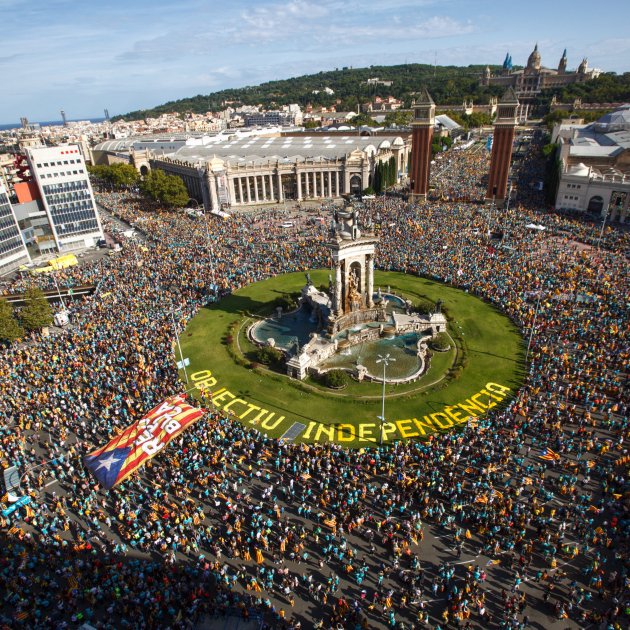The Catalan independence movement has confronted this Diada, its annual big day and Catalonia's National Day, with internal conflicts that thwarted a strategy of unity among political parties. On the stage at Avinguda Maria Cristina in Barcelona, the president of major civil group the Catalan National Assembly (ANC), Elisenda Paluzie, confessed that this has been "the most difficult Diada" organized by the ANC. And yet, hundreds of thousands of people - 600,000 according to Barcelona city police - once again filled the streets of Barcelona to demonstrate their will to continue the contention with the state. This time the focus for the speeches, which did not include any of the usual actions led by the public, was in Avinguda Maria Cristina - although the confluence of the five different sections of the rally was, curiously, in Plaça España.
It was a Diada marked by the approaching Supreme Court verdict in the trial of the 12 pro-independence leaders, a verdict which will be known in a matter of weeks. But it was also defined by the deep differences that separate the two main pro-independence parties on key issues such as the merits or disadvantages of calling elections in Catalonia when the court's sentence is announced, or the response to the investiture of Pedro Sánchez as Spanish prime minister.
In this context, for the first time, neither the parties nor the representatives of the political institutions were invited to occupy the front rows of the demonstration which the ANC had called under the clear, uncompromising slogan of "Objective: Independence". This, however, did not prevent the politicians from being the real protagonists of the day.
The calls for unity were present among the slogans chanted by the public, but above all, they were heard on the stage. Criticisms of the difficulties impeding the desired unity were heard in all the speeches from the moment that actor David Baigès, acting as MC, opened the event calling for a "strategy of unity".
From that point on, all the speakers repeated this appeal in one way or another, until it came to the turn of the leaders of the two main civil groups in the independence movement. The vice president of Òmnium Cultural, Marcel Mauri, called for the parties to show a "sense of state". "Let's not get lost in any more pointless battles," he demanded.
"Only with unity will we finish what we started", advised Paluzie, also warning against abandoning the unilateral route towards independence: "We ask our leaders not to muzzle us." As well, the president of the Association of Municipalities for Independence, Josep Maria Cervera, called for a recovery of the spirit of unity that made the 1st October referendum possible.
In the speeches there was no participation by any representative of the Catalan Association for Civil Rights, which brings together the relatives of the nine Catalan political prisoners. The protagonism of the imprisoned leaders was reserved for the event held earlier in the day by Òmnium, beside the Arc de Triomf. It was the first time that Òmnium had held such an event, organized under the motto "For rights and freedoms, acquittal," and it was also attended by representatives of the Comuns - left-wing, but non-aligned on independence - who did not take part in the rally. A video of mayor Ada Colau was even projected, calling for the acquittal of the 12 accused leaders. Indeed, the will to broaden the protests against the state's repression beyond the independence movement and bring the Comuns into the clamor against a guilty verdict seems likely to be a key issue over the next few weeks.
The Catalan president, Quim Torra, who had called for "generosity and unity" on Tuesday night in his institutional speech, also guaranteeing that all rights that had been denied in Catalonia would have to be re-exercised, asserted today at the demonstration that the Diada "closes a phase, and begins the response to the court verdicts."
The independence movement is aware that, since this response will go beyond its ranks, a message that is less markedly sovereignist than that aired today by the ANC will be necessary. A leading ANC figure recognized this, in comments made after the conclusion of today's event, admitting that from this point on, there should be an emphasis on the calls for civil and political rights and for the freedom of the prisoners, precisely the focus that now unites the pro-independence parties and can bring the Comuns on board.
Today's multitudinous Catalan National Day rally, the continuation of the demonstrations that since 2012 have been the measure of the independence movement's strength on the street, has shown, as Paluzie commented from the stage, that despite the Spanish state's harsh repression, the independence movement remains on its feet. From now on, however, it is proposed that the strategy should be redirected: to make it clear that the response to the state repression is massive in Catalonia, and goes beyond the independence movement.
